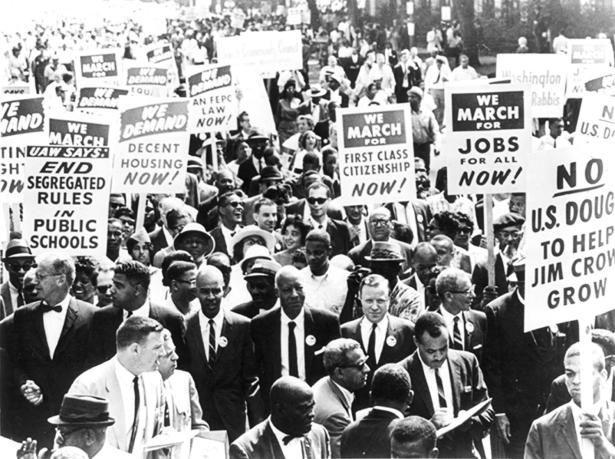[The item has been updated to include significant details.]
July 25, 1956. A state court in Montgomery, Alabama, finds the NAACP to be in contempt of court and fines the organization $10,000. Two days later, the judge doubled down and raised the fine to $100,000. The legal attack had started in June, when the Alabama Attorney General asked the court to ban the NAACP because its activities were "causing irreparable injury to the property and civil rights of the residents and citizens of the state of Alabama." The fact that a judge would take such a charge seriously is a good indication of the venomous hostility that civil rights organizations faced in Deep South courts.
The NAACP managed to appeal the matter to the U.S. Supreme Court, which ruled unanimously that the NAACP's activities in Alabama were protected by the 14th Amendment. https://en.wikipedia.org/wiki/NAACP_v._Alabama
July 26, 1964. Attacking at multiple locations in the Mississippi Delta, racists use dynamite, tear gas and fire bombs in an attempt to terrorize supporters the Freedom Summer voter registration drive. They firebomb buildings being used by voter registration workers, including a house in Hattiesburg, the Rose Hill Church and another house, both near McComb. Two sticks of dynamite are also thrown at the house near McComb, but they don't explode. In Batesville, tear gas forces a family and three civil rights activists to leave the protection of the house. In Mileston a car belonging to voter registration workers is firebombed. In Greenwood, the home of a local civil rights activist is hit by rifle fire. Also in Greenwood, hooded men break into a television studio of and assaulted an announcer.
The day of violence was far from unique then and there. A month earlier, three civil rights activists -- Michael Schwerner, James Chaney and Andrew Goodman -- had been kidnapped. In late July their fate was still unknown, but their bodies were discovered a week later. Eventually 18 people, including a county Sheriff and his Deputy, were arrested. Seven of them, including the deputy, were convicted, but not for murder. https://en.wikipedia.org/wiki/Freedom_Summer
July 27, 1965. President Lyndon Johnson signs Federal Cigarette Labeling and Advertising Act of 1965, which requires “Caution: Cigarette Smoking May Be Hazardous to Your Health” printed on cigarette packages, the world's first mandatory tobacco warning label. Public-health advocates are sharply critical of the bill, because it does not include a proposed requirement that the health warning be included in cigarette advertising and it specifically denies the Federal Trade Commission authority to require such a warning. https://tobaccocontrol.bmj.com/content/23/1/e2.long
July 28, 1932. Two protesters are killed by U.S. Army troops in Washington, D.C. The protesters, most of who are unemployed because of the Great Depression, belong to what is called the Bonus Army, 43,000 people who are camped out in the capital to back up their demand that the government pay a bonus to World War I veterans before it is due. The Hoover administration, which was deaf to their demands, ordered the Army to evict them by force if necessary. https://en.wikipedia.org/wiki/Bonus_Army
July 29, 2013 (10 years ago). Some 2200 fast-food workers in seven U.S. cities go on strike, demanding to be paid $15 an hour. The strike, which is the first in a series of similar walk-outs, is a short-term failure but has a positive long-term impact. Today the minimum wage is at least $15 California, Connecticut, Massachusetts, New York, Seattle and Washington, D.C. By 2026, the minimum wage will be $15 in another six states -- Delaware, Florida, Illinois, Maryland, New Jersey and Rhode Island. Unfortunately, thanks to inflation, the purchasing power of a dollar is 31 percent less that it was in 2013. https://fightfor15.org/
July 30, 1965. President Lyndon Johnson signs the law that creates the Medicare and Medicaid programs, the first national healthcare program in the U.S. Many people who had been calling for national health insurance for half a century were disappointed that the program only covered the elderly and the very poor, but they were pleased to have won that much. https://www.cbpp.org/research/health/medicaid-works-millions-benefit-fr…
July 31, 1966. In a Detroit speech, Stokely Carmichael becomes one of the first civil rights movement leaders to advocate the objective of Black Power. As he put it later, "It is a call for black people in this country to unite, to recognize their heritage, to build a sense of community. It is a call for black people to define their own goals, to lead their own organizations." https://www.blackpast.org/african-american-history/1966-stokely-carmich…


Spread the word